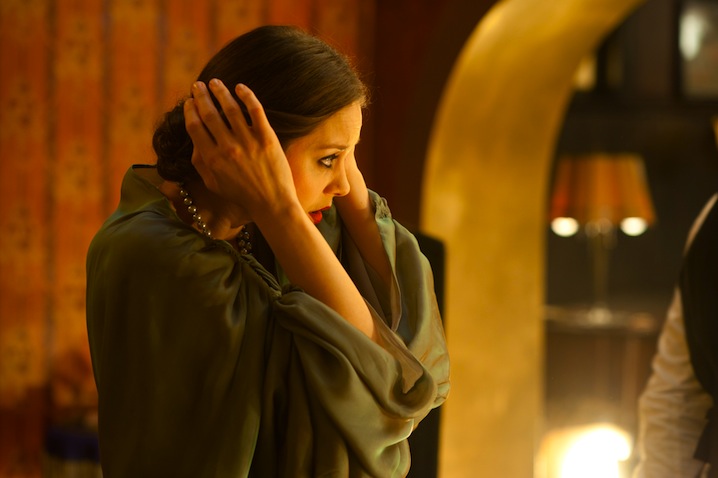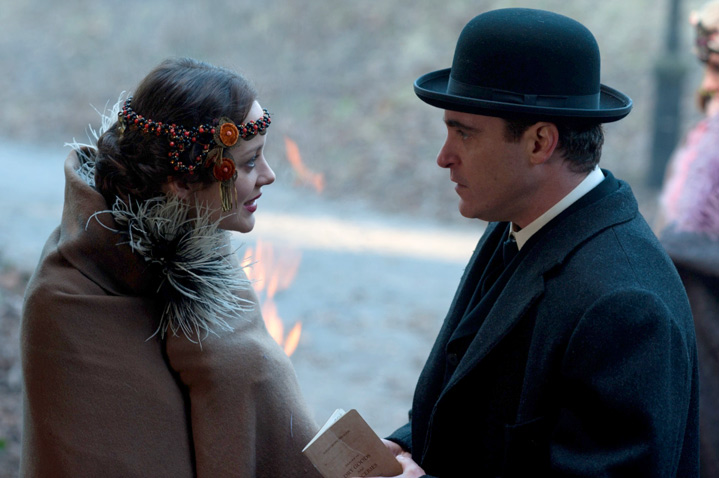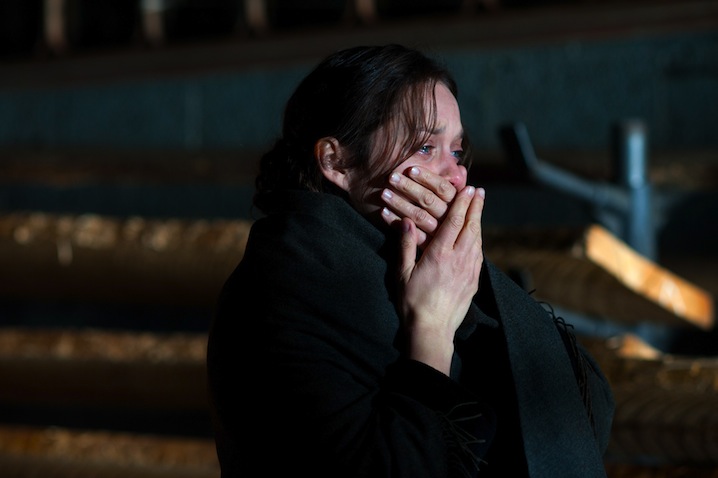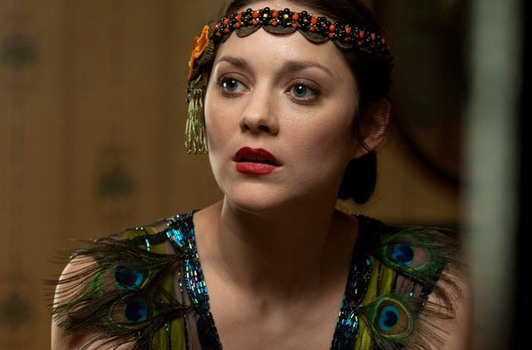By providing your information, you agree to our Terms of Use and our Privacy Policy. We use vendors that may also process your information to help provide our services. This site is protected by reCAPTCHA Enterprise and the Google Privacy Policy and Terms of Service apply.
Marion Cotillard on Learning a Whole New Language to Play a Polish Prostitute in ‘The Immigrant’
Nigel M. Smith

Marion Cotillard is never one to back down from a challenge.
For her breakout, Oscar-winning role in “La Vie en Rose,” the actress mastered Édith Piaf’s vocal delivery to believably portray the icon. A few years later, for Jacques Audiard’s drama “Rust and Bone,” Cotillard, a novice swimmer, learned to become a strong one in a matter of weeks in order to play a whale trainer. The challenge she set out for herself in James Gray‘s period drama “The Immigrant” trumps anything the actress has attempted before. For the film, which opens this Friday in select theaters, Cotillard had to learn a whole new language.
As Ewa, the titular illegal Polish immigrant forced into
prostitution by Joaquin Phoenix’s character after arriving in New York in 1921,
Cotillard gives a powerfully subdued performance full of hurt and anger that many are citing as her biggest achievement since portraying Piaf. Much of that, no doubt,
lies in the fact that she had to learn Polish to take on the role, and learn how to
speak English with a credible Polish accent (and just to remind you: she’s French).
Indiewire sat down with the actress in New York recently to discuss the project.
In the press notes, James Gray says he cast you because of your ability to portray a “non-verbal state of soul.” What was the key to unlocking this character?

The fact that [Ewa] was a nurse before she came to the United States made me think that she was devoted to people. That was an important part of her personality, and an important first stone of the building I was trying to raise. It explains for me, also, how she sees people and the ability she has to see the good side of people even in the darkness. And how devoted she is to her sister… so yeah, the fact that she was a nurse, and that she was devoted, that was important.
Do you always have to latch onto something so specific to form a character?
Well, while I’m discovering the character, yeah, there are a few things that appear very important, and that was one of the very important things. Also, the fact that she’s smart, and she’s seen a lot, and her link to horror makes her bear a lot. She can take a lot, because she comes from a place where she lived the most horrible things. So everything that is horrible in her life will be bearable because she’s been through a lot already.
The only thing she cannot bear is to see her sister in pain. And she wants to protect and preserve the beauty and the pureness that she sees in her. And her life is, it’s not nothing but, the way she’s devoted — she’s going to dedicate her life to her sister. And what is important is that she survives, so that her sister can survive. If she was alone, I don’t think–I mean she would have strength, but I don’t think she would have that level of hope just for herself. I don’t think she would fight like she fights for her own survival. The fact that she survives for her sister makes her stronger.

Would you fight that hard for any loved one in your family?
Oh yeah, absolutely.
Ewa holds so much in throughout the course of the film, but her tragic past is still made palpable through your eyes. How did you work to say so much, without actually saying much at all?
Well, she’s in a situation where she gets to observe things, because she’s not part of this world yet, and she has to understand very quickly how it works. And by being silent and observing what’s going on, I mean in the script, the fact that she’s not talking a lot was already there, obviously, because she doesn’t. I mean she speaks English, but she wouldn’t know how to express herself like she would know how to express herself in Polish. When she arrives there, she doesn’t really know what to say. So she’s taking all the information she can take from people’s behavior, she knows that it’s a different culture, and that she will have to make her way in this country. And when she comes to this country with her sister, she has a true hope. And when her sister is left at Ellis Island, she has a different kind of hope like she has to, in a way, feed her hope that is kind of fading sometimes. She has to feed this hope with everything she can. And even though she’s smart enough to know that Orlando (Jeremy Renner) may not be the key, what brings this relationship to her is the energy of hope, even though she knows that he’s a rotten branch. But the energy of hope helps her to carry on.
And when she does speak, she speaks in Polish, or in English with a Polish accent. Did you speak any Polish before taking this on?
No, not at all.
So what gave you the confidence that you could master the language?

Confidence? [Laughs] Well the thing is, when I choose a role, I never think about the amount of work it’s going to take. And then when I start thinking about it, I think I’m crazy. I talk to myself thinking, “There you are again, with a dialect coach for hours, for days, for months.” But then I just have to do it, I have no other choice. Even James, writing the 20 pages in Polish, didn’t think what it would take for me to get there. And I remember, when we were on set, I was there with my notebook all day long, learning or trying to get comfortable with the language, and one day he said, “Oh! I was wondering, what was this notebook?” He thought it was some notes about the character or something related. So he said “It’s the Polish lines, right?” And I said “Yeah, you wrote 20 pages in Polish so I need to work.” And he didn’t even realize himself that it would take a lot of work for me to get there because Polish is a very hard language. Over the 20 pages, there were three words that sounded like maybe French or English, but the rest of it was totally unknown to me. It was like, if my dialect coach had told me it was Chinese, to me, it was the same thing. One day I told her, I said “It’s not Polish that you’re teaching me — it’s Chinese, be honest.” And actually she had told me that someone had told her that before. Yeah, there’s nothing that looks like English or French there, and I needed to understand every little word, everything, because, well, I needed to know what I was saying.
Did you only learn the words you had to speak, or did you do a brief overview of the whole language?
No, only the words. Well, I watched movies, I listened to recorded books to get the musicality of the accent. But it was a very low-budget movie, and I didn’t have enough time to work.

You only shot for 35 days right?
Yeah. But I mean before, before we started shooting. I started two months before, but two months, it’s nothing. It’s really nothing. So I stuck to the lines I had to learn.
Did you take a break after filming this project to recoup and unwind?
No, I went straight away into another project, and I had to learn a few words of Italian, but I really don’t speak Italian.
On your partner’s film?
Yeah, “Blood Ties.” And that was right after, I went from Polish to Italian. And then I took a year off!
How badly did you need that year off? You shot “The Immigrant” following “Rust and Bone,” another extremely challenging project.
Well the thing is, that was kind of crazy, that I did four movies in one year, and I was a new mom, and before my son turned one, I had done four movies with him, being a mom. It was really crazy. But with the two projects I’d done before, I got pregnant, and sometimes it’s hard to finance them, and suddenly we have the money and we have to shoot now. But then yeah, I really needed to have some time off. Because the thing is, when you’re not shooting a movie, and you’re an actor, and you’ve done movies before, you have to promote those movies, and for a year I didn’t really stop working. But at least I was alone with myself, and not with a character I had to create or think about.
You got back in touch with yourself —
Yeah, you know, you just fill yourself with your life, and then you can go back to work, and you WANT to go back to work. Just doing movies after movies after movies, you’re never alone.
By providing your information, you agree to our Terms of Use and our Privacy Policy. We use vendors that may also process your information to help provide our services. This site is protected by reCAPTCHA Enterprise and the Google Privacy Policy and Terms of Service apply.

















